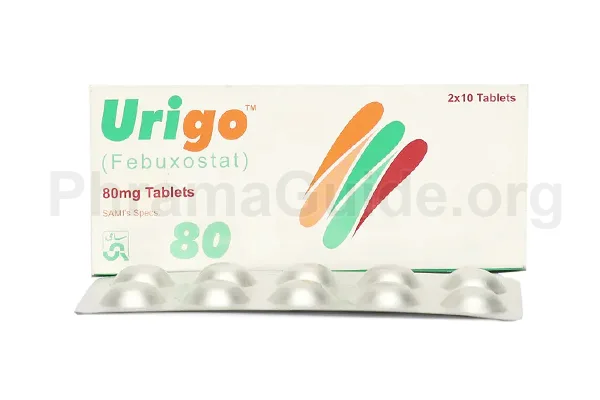Urigo tablet is a medication used in the management of hyperuricemia, which is characterized by elevated levels of uric acid in the blood. When there is too much uric acid in the blood, it can form crystals in the joints, causing pain and inflammation. The following are some common and off-label uses of Urigo Tablet:
Common Uses of Urigo Tablet
- Gout: Urigo is used to lower the levels of uric acid in the blood, preventing the formation of urate crystals and reducing the frequency and severity of gout attacks. It helps manage the symptoms of gout, such as joint pain, inflammation, and swelling.
- Hyperuricemia: Urigo may also be used to lower uric acid levels in individuals with hyperuricemia (high levels of uric acid in the blood) who are at risk of developing gout but have not yet experienced gout attacks.
Off-label Uses of Urigo Tablet
- Tumor Lysis Syndrome: Urigo may be used off-label to prevent and treat tumor lysis syndrome, a potentially life-threatening condition that can occur in cancer patients undergoing chemotherapy. By reducing uric acid levels, Urigo can help prevent the formation of uric acid crystals and associated complications.
- Chronic Kidney Disease: Some studies have suggested that Urigo may have potential benefits in managing hyperuricemia in patients with chronic kidney disease (CKD). Elevated uric acid levels in CKD patients have been associated with an increased risk of cardiovascular events and progression of kidney disease. Urigo may be used off-label in select cases to lower uric acid levels and potentially mitigate these risks.
- Recurrent Calcium Oxalate Kidney Stones: Urigo has been investigated as a potential therapy for recurrent calcium oxalate kidney stones, especially in patients with hyperuricosuria (elevated urinary uric acid levels). By reducing uric acid production, Urigo may help decrease the urinary excretion of calcium oxalate, which is a primary component of kidney stones.

What is Urigo?
Urigo is one of the leading brands of Febuxostat, manufactured and marketed by Sami Pharmaceuticals (Pvt) Ltd, Pakistan.
Urigo Alternatives : Other Similar Brands
The following are some alternative brands of Urigo and their manufacturers.
- Gouric : Pharmevo Pakistan (Pvt) Ltd.
- Zurig : Getz Pharmaceuticals (Pvt) Ltd, Pakistan.
- Febux : Consolidated Chemical Laboratories (Pvt) Ltd, Pakistan.
- Uriguard : Atco Laboratories (Ltd) Pakistan.
- Febhil : Hilton Pharmaceuticals (Pvt) Ltd, Pakistan.
- Hiloric : Highnoon Laboratories (Pvt) Ltd, Pakistan.
- Febuxin : AGP Pharma Pakistan.
- Baristat : Barrett Hodgson Pakistan (Pvt) Ltd.
- Febstat : Pharmatec Pakistan (Pvt) Ltd.
- Adenuric : Solace Pharma
Urigo : Available Formulations and Strengths
Presently, Urigo is available in Tablet Form.
Urigo Tablet: 40mg and 80mg strength.
Who Should Not Use Urigo?
Urigo has certain contraindications, which are specific situations or conditions in which the use of Urigo is not recommended due to potential risks.
Hypersensitivity or Allergy: Urigo should not be used in individuals who have a known hypersensitivity or allergy to Urigo or any of the components of the medication. Serious allergic reactions can occur in susceptible individuals.
Severe Liver Disease: Urigo is metabolized in the liver, and its safety and efficacy have not been established in individuals with severe liver disease. Therefore, Urigo should be avoided or used with caution in patients with severe liver impairment.
Severe Kidney Disease: Urigo is primarily eliminated through the kidneys, and its safety and efficacy have not been established in individuals with severe kidney disease. Therefore, Urigo should be avoided or used with caution in patients with severe renal impairment or end-stage renal disease.
Azathioprine or Mercaptopurine Use: Urigo may interfere with the metabolism of azathioprine or mercaptopurine, medications used to suppress the immune system. Co-administration of Urigo with these medications may lead to increased toxicity, and caution should be exercised when considering their concurrent use.
What is the Recommended Daily Dosage of Urigo?
Urigo Dose for Gout:
- Starting Dose: One Tablet of 40mg, Once daily.
- If the target uric acid level (usually less than 6 mg/dL or 357 µmol/L) is not achieved after two to four weeks, the dose may be increased to 80mg tablet once daily.
Urigo Dose for Hyperuricemia without Gout:
- Starting Dose: One Tablet of 40mg, Once daily.
- If necessary, the dose can be increased to 80mg tablet once daily to achieve the target uric acid level.
How Urigo Works?
Urigo works by inhibiting the activity of xanthine oxidase, an enzyme involved in the metabolism of purines in the body. Purines are natural substances found in certain foods and are also produced by the body. By inhibiting xanthine oxidase, Urigo decreases the production of uric acid in the body.

Leave A Comment